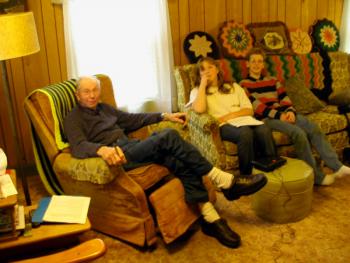Carl Simmons

Finding Friendship Oral History Project
The Finding Friendship Oral History Project is a joint effort of the Friendship Museum and the Friendship Village School, directed by Sally Merrick, museum volunteer, and Gaylea Hynd, teacher. In 2003-2004 sixth grade students conducted taped interviews of three generations of lobstermen and women, as well as others associated with the lobstering industry. Printed copies of the interviews and CDs of the printed transcripts are available at the Friendship Museum in Friendship, Maine.
Peggy Simmons
Carl Simmons, born on June 17, 1927, is the oldest working lobsterman in Friendship. Carl has been lobstering for 65 years, since the age of twelve, and like his father and grandfather before him. Carl left school at age to pursue lobstering as a full-time profession. In addition to lobstering, Carl has also worked as a skilled carpenter and nurtured a love for hunting as a hobby. Carl has three children and six grandchildren.
Scope and Content Note
Carl Simmons provides valuable insights into his life as a lobsterman and his experiences in the industry. The interview covers various aspects of Carl's profession, including his start in lobstering, the role it played in his family, and the tools and techniques he employed. Carl shares details about his boat, a thirty-four-foot wooden vessel, lovingly named the Laurie Ann Ellie after his granddaughters. He discusses the equipment he carried on board, such as a fathometer and compass, as well as the construction of his lobster traps. Over time, the traps had transitioned from spruce wood to wire, thanks to the craftsmanship of Pike Bartlett, the interviewers' father. The interview delves into the intricacies of lobstering, including trap setting, trap identification, and the use of toggles to prevent rope entanglement. Carl reveals that he relied on lobster dealers to supply bait, primarily herring, and described a typical day on the water, hauling around 100 to 110 traps within a six-mile radius of Friendship. The interview also explores the impact of weather on lobstering, with Carl highlighting how strong winds would halt their operations. Reflecting on the changes in the industry, he mentions the shift from wooden traps to wire ones as the most significant transformation he had witnessed. Carl expresses his appreciation for the autonomy lobstering provided, relishing the role of being his own boss. Carl shares a few challenges he had faced at sea, including grounding his boat, experiencing engine failures, and being towed back to shore by the Coast Guard. He recounts a harrowing incident where he had to jettison his traps due to flooding. The interview concludes with discussions on Carl's fishing habits, lobster prices determined by his dealer, and his preference for plain boiled lobster. The conversation also touches on personal matters, such as a recent fire that had damaged his boat and the kindness of a fellow lobsterman, Brad Davis, who offered his own vessel, named Outlaw, for Carl to use.
Please Note: The oral histories in this collection are protected by copyright and have been created for educational, research and personal use as described by the Fair Use Doctrine in the U.S. Copyright law. Please reach out Voices@noaa.gov to let us know how these interviews are being used in your research, project, exhibit, etc. The Voices staff can help provide other useful resources related to your inquiry.
The NOAA mission is to understand and predict changes in climate, weather, oceans, and coasts, to share that knowledge and information with others, and to conserve and manage coastal and marine ecosystems and resources. The Voices Oral History Archives offers public access to a wide range of accounts, including historical materials that are products of their particular times, and may contain offensive language or negative stereotypes.
Voices Oral History Archives does not verify the accuracy of materials submitted to us. The opinions expressed in the interviews are those of the interviewee only. The interviews here have been made available to the public only after the interviewer has confirmed that they have obtained consent.
